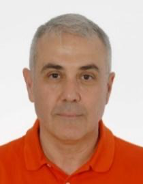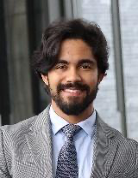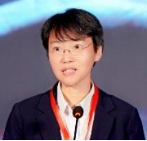IEEE European Public Policy Committee (EPPC) Panel on Artificial Intelligence
18 September 2024 – morning
Understanding the AI Act:
Implementation, Impacts and Implications for various technology domains
This policy panel explores how the EU AI Act may affect various technology domains, including the ICT infrastructure, networks, connectivity, transportation, and healthcare. The panel also looks at the roles that technologists may play to support the operationalization of the AI Act and at their responsibilities in ensuring compliance with the provisions of the AI Act.
Moderated by Cecilia Metra
Talk 1 by Constantinos Balictsis
The EU AI Act in the ‘Digital Decade 2030’ Realm
The twin Digital and Green transitions led to a host of EU interventions. The EU adopted and closely monitors the ‘Digital Decade Policy Programme’ where, by 2030, major collective targets pertain to secure and sustainable digital infrastructures delivering gigabit connectivity for everyone and 5G coverage everywhere, as well as the wide deployment and adoption of AI. Deployment and uptake of ‘Very High-Capacity Networks’ constitute major EU objectives to increase the capacities/ capabilities from the core network to the very edge, to satisfy existent and anticipated user demands of a data-driven society, and to enhance the competitiveness of the EU economy. AI may be utilized in the operation/management of such end-to-end critical digital infrastructures while it also employs these infrastructures to provide data-driven applications/services in disparate economic sectors/verticals. Moreover, in the EU, the announced ‘AI Innovation’ package complements the adopted AI Act to promote trustworthy AI and facilitate an innovative AI ecosystem. The ramifications of the AI Act’s risk-based approach on the critical digital infrastructures and aspects soliciting further constructive contributions by stakeholders will be highlighted.
Talk 2 by Yuri Ladeia
The intersections and overlaps between EU Compliance Regulations in Health: AI Act, EHDS, MDR and GDPR
Although complex, EU compliance regulations integrate various challenges through a common logic. The identification and harmonisation through standards of the different regimes in the health context, from those of specific application (AI Act, Medical Device Regulation – MDR) to those of general application (GDPR), can simplify the application of the regulations. For example, the AI Act is based on the MDR, requiring conformity assessments and certification by notified bodies, using a risk-based classification system and focusing on the traceability of products throughout their life cycle, including clinical evaluation and market surveillance. More than connections, there is also, among the various aspects of the interaction between the MDR, GDPR and AI Act, the potential overlap of obligations and responsibilities between the various players who are obliged to comply with the respective regulations, from the Provider, User, Importer or Distributor. Clarifying the overlaps and identifying the intersections is the key to boosting sustained innovation in digital health, biomedical research and the reuse of data to create value.
Talk 3 by Meng Lu
The EU AI Act Implications for the Transport Systems and Standards Requirements
AI is not new, but becomes a fast runner on the market, including applications in ITS (Intelligent Transport Systems). Technologies in the ITS domain include, e.g. control system engineering, (absolute and relative) positioning, communications, sensing and information processing. A wide range of products, solutions and services have been applied to all modes of transport (even the third dimension for Urban Air Mobility), and to cross-sector multi-modal logistics and supply chains. Future mobility is not only intended to improve the quality of life, but also to create thriving communities, by better caring for, and even restoring nature and the environment, supporting economic growth, and increasing the potential positive social impact. This talk focuses on AI and ITS, addresses relevant standards issues, shares recommendations from the IEEE European Public Policy Committee (EPPC), especially regarding Privacy and Data Protection, Cybersecurity, Public Safety, Product Dependability, Interoperability, Accessibility, as well as Land Use and Traffic.
 Constantinos Balictsis holds a PhD in electrical engineering, a MSc in Applied Economics and Finance and was a “Marie Skłodowska-Curie” post-doctoral fellow. He served as senior ICT policy adviser to the Greek Ministry for Communications. Since 2000, he is with the Hellenic Telecommunications and Post Commission. He served as EETT’s first Telecommunications Director and exercises senior advisory and management functions including Department Head and Project Manager responsible for EU co-financed national projects. He has participated in EC committees, in meetings with the IMF, OECD, financial investors, international Regulatory Authorities and cooperated with domestic ministries and various foreign national entities. He is actively involved in research, mainly, on electromagnetic wave propagation and on optical access networks. He regularly gives presentations on regulatory and technology issues pertinent to the electronic communications sector. He is a member of the IEEE, the IEEE EPPC WG on ICT (Telecommunications and AI Sub-WGs) and OPTICA.
Constantinos Balictsis holds a PhD in electrical engineering, a MSc in Applied Economics and Finance and was a “Marie Skłodowska-Curie” post-doctoral fellow. He served as senior ICT policy adviser to the Greek Ministry for Communications. Since 2000, he is with the Hellenic Telecommunications and Post Commission. He served as EETT’s first Telecommunications Director and exercises senior advisory and management functions including Department Head and Project Manager responsible for EU co-financed national projects. He has participated in EC committees, in meetings with the IMF, OECD, financial investors, international Regulatory Authorities and cooperated with domestic ministries and various foreign national entities. He is actively involved in research, mainly, on electromagnetic wave propagation and on optical access networks. He regularly gives presentations on regulatory and technology issues pertinent to the electronic communications sector. He is a member of the IEEE, the IEEE EPPC WG on ICT (Telecommunications and AI Sub-WGs) and OPTICA.
 Yuri Ladeia is a legal researcher at the Centre for Justice and Governance at the School of Law, University of Minho, Braga, Portugal (JUSGOV). His research and expertise focus on Health law, the legal interceptions and overlaps aspects of the life sciences ecosystem in digital services, data (re)use and protection for biomedical innovation, European data spaces, data intermediation and altruism, Medical Devices, and Artificial Intelligence applied to health. He holds two bar admissions, to practice law in Portugal and Brazil, with approximately 10 years of experience as an International Lawyer and Data Protection Officer. He holds Data Protection International Certifications, and a master’s degree in Law and Informatics from the School of Law, University of Minho, where he is pursuing a PhD in Legal Sciences under AI and Data Protection. He is the author of academic and opinion publications and is a guest lecturer on the same issues in life sciences and technology higher education institutions in Portugal.
Yuri Ladeia is a legal researcher at the Centre for Justice and Governance at the School of Law, University of Minho, Braga, Portugal (JUSGOV). His research and expertise focus on Health law, the legal interceptions and overlaps aspects of the life sciences ecosystem in digital services, data (re)use and protection for biomedical innovation, European data spaces, data intermediation and altruism, Medical Devices, and Artificial Intelligence applied to health. He holds two bar admissions, to practice law in Portugal and Brazil, with approximately 10 years of experience as an International Lawyer and Data Protection Officer. He holds Data Protection International Certifications, and a master’s degree in Law and Informatics from the School of Law, University of Minho, where he is pursuing a PhD in Legal Sciences under AI and Data Protection. He is the author of academic and opinion publications and is a guest lecturer on the same issues in life sciences and technology higher education institutions in Portugal.
 Dr. Meng Lu (The Netherlands) works as an independent expert for Aeolix ITS. She is a member of the Board of Governors of the IEEE Standards Association (IEEE SA); Member of the IEEE TAB Committee on Standards (TCoS); VP Standards Activities & Standards Committee Chair for IEEE Intelligent Transportation Systems Society (ITSS); Steering Committee member of the IEEE Future Networks Technical Community (FNTC); Chair of IEEE ITSS Chapter Benelux. Besides active involvement in a range of R&D activities in the ICT-based domain of Intelligent Transportation Systems since 2002, she has contributed to standards development, inter alia in the framework of IEEE and ISO/TC 204 – Intelligent transport systems (also Head of Delegation (The Netherlands) January 2021 – April 2023). PhD at Lund University, Sweden; Master’s title and degree of Engineering in The Netherlands and P.R. China.
Dr. Meng Lu (The Netherlands) works as an independent expert for Aeolix ITS. She is a member of the Board of Governors of the IEEE Standards Association (IEEE SA); Member of the IEEE TAB Committee on Standards (TCoS); VP Standards Activities & Standards Committee Chair for IEEE Intelligent Transportation Systems Society (ITSS); Steering Committee member of the IEEE Future Networks Technical Community (FNTC); Chair of IEEE ITSS Chapter Benelux. Besides active involvement in a range of R&D activities in the ICT-based domain of Intelligent Transportation Systems since 2002, she has contributed to standards development, inter alia in the framework of IEEE and ISO/TC 204 – Intelligent transport systems (also Head of Delegation (The Netherlands) January 2021 – April 2023). PhD at Lund University, Sweden; Master’s title and degree of Engineering in The Netherlands and P.R. China.
 Prof. Cecilia Metra is a distinguished full Professor and the Deputy President of the School of Engineering at the University of Bologna, Italy. She received her Laurea Degree (summa cum laude) and Ph.D. in electronic engineering and computer science from the same institution. In 2002 she was a Visiting Faculty Consultant for Intel Corporation. Prof. Metra was the 2022 and 2023 IEEE Director/Division V Delegate, and the 2019 President of the IEEE Computer Society. From 2020 to 2023, she was also part of the IEEE EPPC, chairing its Working Group on ICT (2021-2022). She has received two Meritorious Service Awards, six Certificates of Appreciation, and the Spirit of the Computer Society award from the IEEE Computer Society.
Prof. Cecilia Metra is a distinguished full Professor and the Deputy President of the School of Engineering at the University of Bologna, Italy. She received her Laurea Degree (summa cum laude) and Ph.D. in electronic engineering and computer science from the same institution. In 2002 she was a Visiting Faculty Consultant for Intel Corporation. Prof. Metra was the 2022 and 2023 IEEE Director/Division V Delegate, and the 2019 President of the IEEE Computer Society. From 2020 to 2023, she was also part of the IEEE EPPC, chairing its Working Group on ICT (2021-2022). She has received two Meritorious Service Awards, six Certificates of Appreciation, and the Spirit of the Computer Society award from the IEEE Computer Society.

